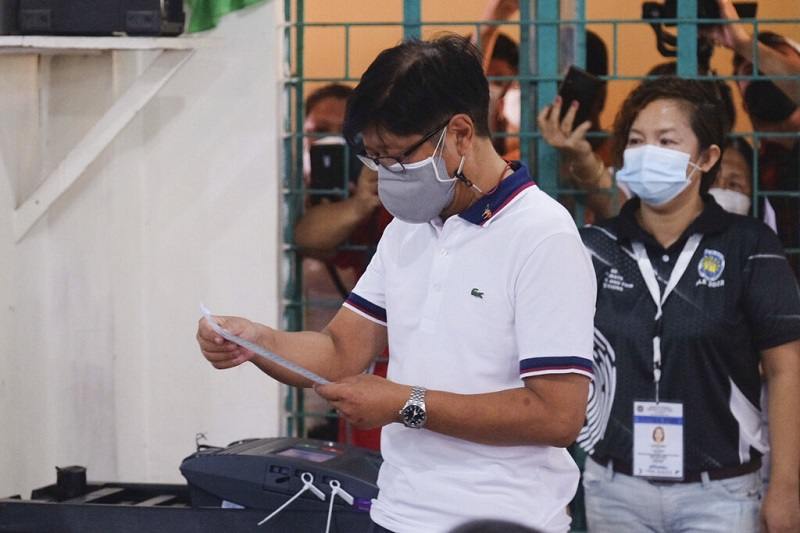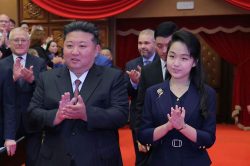
Presidential candidate Ferdinand Marcos Jr., the son of the late dictator, looks at the receipt after voting at a polling center in Batac City, Ilocos Norte, northern Philippines on Monday, May 9.
11:33 JST, May 10, 2022
MANILA, Philippines (AP) — The namesake son of late Philippine dictator Ferdinand Marcos appeared to have been elected Philippine president by a landslide in an astonishing reversal of the 1986 “People Power” pro-democracy revolt that booted his father into global infamy.
Marcos Jr. had more than 30.5 million votes in the unofficial results with more than 96% of the votes tabulated overnight after Monday’s election. His nearest challenger, Vice President Leni Robredo, a champion of human rights and reforms, had 14.5 million, and boxing great Manny Pacquiao appeared to have the third highest total with 3.5 million.
His running mate, Sara Duterte, the daughter of the outgoing leader and mayor of southern Davao city, had a formidable lead in the vice presidential race, which is separate from the presidential race.
The alliance of the scions of two authoritarian leaders combined the voting power of their families’ political strongholds in the north and south but compounded worries of human rights activists.
Marcos Jr. and Sara Duterte avoided volatile issues during their campaign and steadfastly stuck instead to a battle cry of national unity, even though their fathers’ presidencies opened some of the most turbulent divisions in the country’s history.
Marcos Jr. has not claimed victory but thanked his supporters in a late-night “address to the nation” video, where he urged them to stay vigilant until the vote count is completed.
“If we’ll be fortunate, I’ll expect that your help will not wane, your trust will not wane because we have a lot of things to do in the times ahead,” he said.
Robredo has not conceded defeat but acknowledged the massive Marcos Jr. lead in the unofficial count. She told her supporters the fight for reforms and democracy won’t end with the elections.
“The voice of the people is getting clearer and clearer,” she said. “In the name of the Philippines, which I know you also love so dearly, we should hear this voice because in the end, we only have this one nation to share.”
She asked her supporters to continue to stand up: “Press for the truth. It took long for the structure of lies to be erected. We have the time and opportunity now to fight and dismantle this.”
The election winner will take office on June 30 for a single, six-year term as leader of a Southeast Asian nation hit hard by two years of COVID-19 outbreaks and lockdowns and long-troubled by crushing poverty, gaping inequalities, Muslim and communist insurgencies and deep political divisions.
The next president will also likely face demands to prosecute outgoing President Rodrigo Duterte for thousands of killings during his anti-drug crackdown — deaths already under investigation by the International Criminal Court.
Marcos Jr., a 64-year-old former provincial governor, congressman and senator, held a wide lead in pre-election surveys. But Robredo had tapped into shock and outrage over the prospect of a Marcos recapturing the seat of power and harnessed a network of campaign volunteers to underpin her candidacy.
After his ouster by the largely peaceful 1986 uprising, the elder Marcos died in 1989 while in exile in Hawaii without admitting any wrongdoing, including accusations that he, his family and cronies amassed an estimated $5 billion to $10 billion while he was in power. A Hawaii court later found him liable for human rights violations and awarded $2 billion from his estate to compensate more than 9,000 Filipinos who filed a lawsuit against him for torture, incarceration, extrajudicial killings and disappearances.
His widow, Imelda Marcos, and their children were allowed to return to the Philippines in 1991 and worked on a stunning political comeback, helped by a well-funded social media campaign to refurbish the family name.
Marcos Jr. has defended the legacy of his father and steadfastly refused to acknowledge and apologize for the massive human rights violations and plunder under his father’s strongman rule.
Officials said Monday’s election was relatively peaceful despite pockets of violence in the country’s volatile south that killed at least four people in the country’s volatile south. Thousands of police and military personnel were deployed to secure election precincts, especially in rural regions with a history of violent political rivalries.
Filipinos stood in long lines to cast their ballots, with the start of voting delayed by a few hours in a few areas due to malfunctioning vote machines, power outages, bad weather and other problems.
Aside from the presidency, more than 18,000 government posts were on the ballot, including half of the 24-member Senate, more than 300 seats in the House of Representatives, as well as provincial and local offices across the archipelago.
In the 2016 vice presidential race, Robredo defeated Marcos Jr. by a narrow margin in their first political faceoff. He waged a years-long legal battle against her victory, alleging fraud, that got defeated but he never conceded.
Top Articles in News Services
-

Prudential Life Expected to Face Inspection over Fraud
-

Hong Kong Ex-Publisher Jimmy Lai’s Sentence Raises International Outcry as China Defends It
-

Japan’s Nikkei Stock Average Touches 58,000 as Yen, Jgbs Rally on Election Fallout (UPDATE 1)
-

Trump Names Former Federal Reserve Governor Warsh as the Next Fed Chair, Replacing Powell
-

Suzuki Overtakes Nissan as Japan’s Third‑Largest Automaker in 2025
JN ACCESS RANKING
-

Japan Institute to Use Domestic Commercial Optical Lattice Clock to Set Japan Standard Time
-

Israeli Ambassador to Japan Speaks about Japan’s Role in the Reconstruction of Gaza
-

Man Infected with Measles May Have Come in Contact with Many People in Tokyo, Went to Store, Restaurant Around When Symptoms Emerged
-

Prudential Life Insurance Plans to Fully Compensate for Damages Caused by Fraudulent Actions Without Waiting for Third-Party Committee Review
-

Woman with Measles Visited Hospital in Tokyo Multiple Times Before Being Diagnosed with Disease























